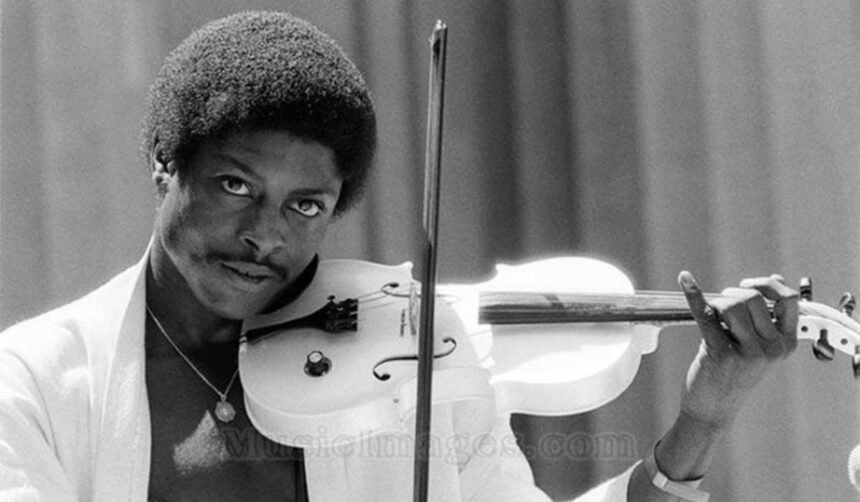Fern Gillespie
Noel Pointer burst on the music scene in the 1970s as a young brilliantly talented jazz violinist. The Brooklyn-born musician had studied classical violin at the High School of the Performing Arts and at the Manhattan School of Music. By 1982, radio stations from jazz to R&B were playing his melodic smooth jazz-fusion sound.
His albums All My Reasons and Direct Hit were nominated for Grammy Awards. His debut album, Phantazia went platinum and five albums were listed on Billboard’s jazz chart. As a freelance musician, his credits included the Apollo Theater Orchestra, Love Unlimited, Dance Theater of Harlem Orchestra and Broadway shows, including Guys and Dolls and Dreamgirls.
A community activist, Pointer was an early advocate for the African Burial Ground in New York. He also received special citations from the United States Congress, the US Congressional Black Caucus, and the African National Congress. In 1994, at age 39, he suddenly died of a stroke leaving his wife Chinita, a school administrator, a widow with three children.
In 1995, with the support of the Pointer family, Chinita Pointer founded the Noel Pointer Foundation. It continues to provide music instruction and performance opportunities for Black and Hispanic children ages 3 to 18 in New York City public schools and out of school programs. Over the years, its music professionals have worked with 37,000 children in 50 Title 1 schools and daycare centers who have learned to perform with a string musical instrument. Headquartered in Bed Stuy Restoration Plaza at 247 Herkimer Street, the Noel Pointer Foundation also holds professional music classes for children and adults.
The Noel Pointer Foundation’s young alumni have been accepted at New York City’s specialized middle schools and high schools and have gone to America’s prestigious colleges like Juilliard, Berklee College of Music, Harvard, Yale, Howard, Syracuse, Duke and Amherst. Many have returned as mentors and counselors to work with the young students.
Our Time Press spoke to Chinita Pointer, President and CEO of the Noel Pointer Foundation about the impact of introducing Black and Hispanic youth to the world of string music.
OTP: What makes The Noel Pointer Foundation program unique?
CP: Our program is unique because the majority of our students are of color. That’s what I wanted. My goal was to make sure students of color received quality music education.
OTP: The Noel Pointer Foundation specializes in teaching string instruments to Black and Hispanic youth –violin, viola, cello, double bass, piano and classical guitar. Why is it more complex to learn to play string instruments?
CP: Noel used to always say that learning how to play a string instrument is the hardest instrument. There’s coordination and the dexterity of having to play a string instrument. Not only are you having to use your hands and your eyes, but you have to be able to be able to have one hand holding the bow. The other hand is holding the instrument.
Then you have to be able to read the music and have your hands positioned in a way where the intonation is clear. You’re doing three things at one time to create a piece of music. You have to make sure that the bow is in a certain position so that it’s not out of tune. Because if you don’t have that bow in that certain position, that’s when you hear that screeching noise. It just sounds horrible. So intonation is very important, and technique is very important when it comes to playing the string instrument.
OTP: The Noel Pointer Foundation Players are known as an elite chamber ensemble of Black and Hispanic youth. What has been the impact of the NPF Players?
CP: Our Noel Pointer Foundation Players are the string ensemble that we send out to represent the Noel Pointer Foundation. They played at Lincoln Center, Carnegie Hall, political inaugurations and special events. They have performed all over the New York metropolitan area. We’re looking forward to bringing in more students to join that ensemble.
Not only do they do classical music, our kids are learning different genres of music. We do a Fiddle Fest concert every year. What we do for our Fiddle Fest concert is choose a theme. Last year, our theme was Motown, so the kids got to play pieces from Motown. Which was amazing. This year, we’re doing musicals that were on Broadway. They get a kick out of it.
The music is familiar to familiar with some of the kids. It gives them an opportunity to play not just play classical, but to be able to play the other genres of music, which makes it more exciting.
OTP: What type of life skills do children learn by performing music?
CP: Classical music is our foundation because it’s very important that our kids learn how to read music. It’s important that they understand intonations, understand that they know technique and poise. It builds character, learning how to play with your peers. Even if it’s a duet or a quartet or a larger ensemble, you have to listen to your peers while you’re playing. You’re able to blend those sounds and that melody and able to project.
You’re building character and developing your self-esteem along the way. We do studio recitals every year as well so that kids can perform solo. It’s difficult getting in front of the audience and speaking and performing. I don’t care how old or young you are.
It’s a bit nerve-wracking. This is something that really helps our children develop their skills and their confidence by playing and performing in front of other people. For the studio recitals, its small audience that’s made up of their parents and special guests that takes place in on our campus at Bedford Stuyvesant Restoration.
OTP: The Noel Pointer Foundation teaches string musical instruments to youth ages 3 to 18. How do you teach music to a 3-year-old?
CP: They say you have 20 minutes to work with a three-year old. If you keep them engaged, you’re great. You must have games. You must have exercises and repetition in order to keep their attention. They learn quickly and they retain information quickly. It has to be hands on. So, if you have a tambourine or you have a piano, you can use clapping and stomping exercises and singing exercises.
They love to sing songs that they are familiar with. You do those things that they are familiar with in order for you to teach them. Then you incorporate the instruments and different sounds, counting and numbers. You’re telling a story as well. You have “Twinkle, Twinkle” and they do it in variations. They start off with one note and then they’ll develop that one node into a song. There are other variations that our teachers use.
It’s pretty much the Suzuki method in terms of teaching them the fundamentals of music. Then as time goes on, you want to teach them what the notes are because the notes are very important. Posture is very important, technique is very important, intonation is very important, and having fun is really, really important.
The Noel Pointer Foundation has received a $11.6 million grant from New York City to restructure a firehouse in Cobble Hill as it’s new headquarters. For more information on the music program, visit www.noelpointer.org











